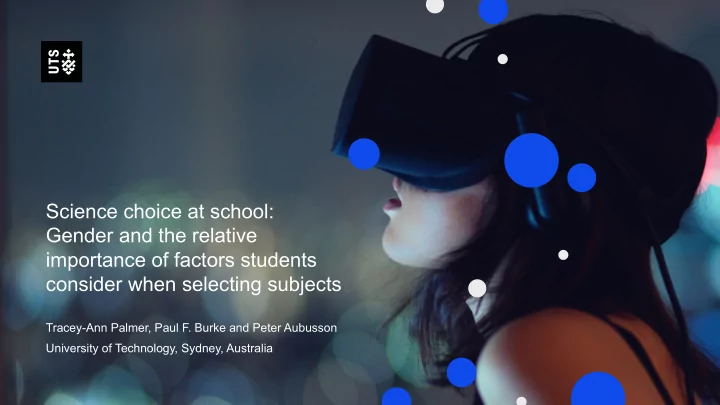

Science choice at school: Gender and the relative importance of factors students consider when selecting subjects Tracey-Ann Palmer, Paul F. Burke and Peter Aubusson University of Technology, Sydney, Australia
Today Inspiration Fresh Minds for Science Method General findings Gender To find out more 2
Ainley, Kos, & Nicholas 2008 % choosing science
CHOICES GENDER SELF EFFICACY INTEREST IDENTITY FUTURE NEEDS SOCIO-ECONOMIC STATUS
What is the relative importance of the factors that students consider in choosing their subjects for their final years of school? 5 RESEARCH QUESTION
Mixed Methods approach Marketing focus Theory of Reasoned Action Qualitative data Qualitative data Focus Environ- Group ment New Phase Phase Knowledge Survey Phase Quantitative data 9 events 50 students 15 interviews (10 groups) 5 schools 4 schools 378 Students from 5 schools 6
I think that there has to be a balance between what you are good at and what you love because if you choose everything that you love, you might not necessarily be doing very well and it might bring your marks down, but if you choose things that you are doing really well in, but you might not necessarily love FOCUS GROUP PHASE them, you are not going to have the motivation to keep doing well. 7 Year 10 Girl
Focus Group Phase Subject residual LIKE NEED & DISLIKE First ENJOY stage UNSURE Reject Choose subject subject SUBJECTS TOO TOO STUDENT IS FEW INTERESTED MANY IN Second stage Information Find subjects Find subjects & to choose to reject Unbiased advice 8
Focus Group Phase 7 Areas 21 Factors Advice Parents, peers, older peers, teacher Engagement Interest, enjoyment Logistics Units, timetable, information Ability Ability, ATAR, mark expectation Subject characteristics Assessment, classwork, difficulty Teaching Quality, style, like/dislike Usefulness Future study, personal life, career CHOOSE REJECT • I will find the subject interesting • I don't think the subject's • I enjoyed the subject (or similar teachers can help me get a subject) good mark • in middle school • I do not like how the subject is taught • I dislike a teacher or teachers I might get
Focus Group Phase Circle graph showing Ability similarity between coding in nodes 10
Survey Phase Best-Worst Scaling A survey method where respondents choose the best and worst option from sets of factors to determine the relative importance of factors affecting a decision Louviere, J. J., Flynn, T. N., & Marley, A. A. J. (2015). Best-worst scaling: Theory, methods and applications. Cambridge University Press. Cambridge: United Kingdom. 11
Survey Phase Please think about how you chose your subjects for Year 11. For each of the sets of features below, please choose the feature that you find most important AND least important in choosing a subject to study. 12
BWS)Accept 5.)Interest)expectation 21.)Need)for)career 12.)Mark)expectation 19.)Need)for)future)study 6.)Enjoyment)experience)*** 10.)Ability)* 14.)Classwork)style)* 20.)Need)for)personal)life 15.)Difficulty 9.)Information 11.)ATAR)scaling 16.)Teacher)quality 4.)Teacher)advice 1.)Parent)advice)* 17.)Teaching)style 13.)Assessment)type 18.)Teacher)like/dislike Male v Female correlation: 0.89 2.)Older)peer)advice 3.)Peer)advice)** 7.)Number)of)units 8.)Timetable)fit !3 !2 !1 0 1 2 3 4 Female Male
BWS'! Reject 6.'Enjoyment'experience'* 5.'Interest'expectation 21.'Need'for'career 12.'Mark'expectation 19.'Need'for'future'study 14.'Classwork'style 10.'Ability'*** 16.'Teacher'quality 15.'Difficulty'* 17.'Teaching'style 4.'Teacher'advice 11.'ATAR'scaling 1.'Parent'advice'* 20.'Need'for'personal'life 7.'Number'of'units 18.'Teacher'dislike'* 9.'Information Male v Female correlation: 0.98 13.'Assessment'type 2.'Older'peer'advice 8.'Timetable'fit'* 3.'Peer'advice'*** !3 !2 !1 0 1 2 3 Female Male
Compared to boys … Girls scored how much they enjoyed and were interested in a subject more highly when choosing subjects Girls scored their ability in a subject and how difficult it is more highly when rejecting subjects 15
BUT Boys and girls are more similar than different in the way they choose their subjects Girls also seem to be in more agreement Image: http://creativityunleashed.wikia.com/ wiki/File:Boy-girl-holding-hands-ka.jpg 16
Science is more work Science is only useful for a science career Time Need Effort Interest Resources Enjoyment Science may be Cost Benefit overpriced and undervalued 17
18 Science needs to be seen by students as: Valuable: useful in a range of careers Achievable: a subject that students can succeed in Empowering: useful in life because it teaches important skills 18
Some Approaches 1. Talks from successful science grads in “non-science” jobs 2. Subject selection information to stress broad use of science 3. Highlight growth areas that need science 4. Teach fun topics just prior to choice 5. No hard tests just prior to choice 6. Scaling or bonus points for university entrance
To find out more… Contact me at Tracey-Ann.Palmer@uts.edu.au Or at my website freshmindsforscience@weebly.com 20
Thank you
Next Further research is needed…. • Do BWS but just for science • A DCE to see how students trade-off factors http://www.cosmosup.com/ science-can-be-funny/4/ 22
OVERALL Accept Reject Girls higher Interest expectation (1) Enjoyment experience (1) than boys Enjoyment experience (5) Past ability (4) Ability (6) Classwork style (3) Classwork style (7) Girls lower Parent advice (15) Parent advice (17) than boys Peer advice (20) Peer advice (21) Disliking a teacher (15) 23 education.uts.edu.au
Top 7 factors Reject Accept 1. Interest expectation 1. Enjoyment experience 2. Need for career 2. Interest expectation 3. Difficulty 3. Difficulty 4. Need for future study 4. Ability 5. Enjoyment experience 5. Classwork style 6. Ability 6. Need for career 7. Classwork style 7. Need for future study 24
ACCEPT Factor Male Female 1. Parent advice -0.55 -1.08 3. Peer advice -1.91 -2.67 5. Interest expectation 2.33 2.89 6. Enjoyment experience 0.99 1.98 10. Ability 0.97 1.64 14. Classwork style 0.95 1.55 25
REJECT Factor Male Female 1. Parent advice -0.17 -0.84 3. Peer advice -1.49 -2.74 6. Enjoyment experience 1.28 1.94 8. Timetable fit -1.47 -0.76 10. Ability 0.38 1.55 15. Difficulty -0.06 0.52 18. Teacher dislike 0.11 -0.40 26
Recommend
More recommend